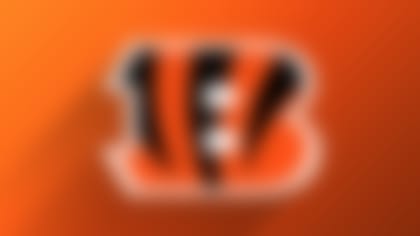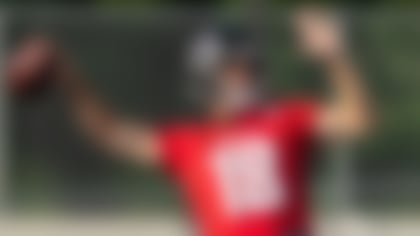The story goes that, back in 2011, right after Jadeveon Clowney committed to South Carolina, he told the coaches there: "I'll be here three years, and then I'll be the first pick in the draft."
In that sense, the 6-foot-6, 266-pound monster has put himself in position to potentially accomplish what he set out to do when he left Rock Hill, S.C., for nearby Columbia.
But it's what Clowney left unaccomplished that has driven the discussion over the past six months. In his final season with the Gamecocks, Clowney's sack total plummeted (he had three after posting 13 in 2012), his tackles for loss fell (from 23.5 to 11.5), and he forced just one fumble after causing eight over his first two years.
Naturally, most of the questions since have revolved around his drive and his motor, and whether his focus was too fixed on the end game referenced above.
Other obvious queries haven't been raised as frequently. What if, five years from now, Clowney does make the most of his ability? What if the statistical decline was a mirage rather than a predictor? What if he gets everything out of his obscene natural gifts?
"Right now, today, he's a damn good NFL player, no matter what," a veteran NFC personnel executive said. "The kid could've started in the NFL his freshman year, the way he played. It's not that he doesn't have good tape. And if you hit on him, he's Reggie White. His God-given talent is better than 99 percent of the NFL. ... He's gonna be 275 to 285 pounds, and he moves like he's 250. If you hit on him, he changes the game."
That assessment certainly doesn't lack for superlatives, but to some, the "ifs" are seen as a bigger deal.
"What are you buying?" another NFC personnel exec said. "I'm not sure. He can be a big-time player, but is he gonna be? The wiring, the motor, the questions about shutting it down -- it's really scary. It's boom or bust. I don't know how important football is to him."
And so, as anyone with access to a sliver of college football information last fall could've forecast, Clowney's pre-draft process has been more about passing the psychological tests than the physical ones he could ace blindfolded.
Five years from now, when Clowney's rookie deal has expired and he's 26 years old, he very well could be among the best players in the NFL. How to get him there will be the challenge for the Houston Texans -- or whoever secures his services on May 8.
Trevor Moawad worked with Clowney for eight weeks before the 2014 NFL Scouting Combine, and then four days leading up to his pro day in South Carolina, so admittedly, his sample size is limited. What he saw, though, was a kid he believes has the drive to be great.
Proof? He'll point you to the 40-yard dash that Clowney ran in Indianapolis. And it's not the freakish 4.53 time that Moawad wants to highlight. It's the form he exhibited -- "He looked like Usain Bolt" -- that, to the trainer, served as proof positive of a player committed to being the very best.
"I'd heard the same things everyone else did -- that the kid was all aptitude," said Moawad, vice president of pro and elite sports at EXOS (formerly known as Athletes Performance). "And that's not what I saw."
Moawad continued: "If you believe in your ability as a head coach and your ability as a coaching staff, you'll have no problem taking the kid. I felt the effort we got from him for his combine preparation was 100 percent."
At EXOS, Clowney's path to greatness has been broken down into three parts.
Aptitude comes first, and Clowney has that in spades. His straight-ahead speed is proven, and Moawad said what was really eye-popping was seeing "the lateral agility of a second baseman."
Second is knowledge and education. That part will come down to Clowney's ability to stay in his playbook, digest what he's being taught and apply it on the field. If the job he did in honing his track form before the combine is any indication, Clowney certainly has the athletic intelligence to get that done.
Third comes a player's desire to be great. And that's where the environment he's about to enter becomes key.
"I think being dominant is important to him," Moawad said. "He's always been at the top, he expects to be there at the next level. He'll recognize quickly -- when he gets around players that are much better than they were, even in the SEC -- what it takes to be great at that level. He hasn't always had to work as hard to be better than everyone else. Maybe he didn't maximize his ability at times (last) year, but he was still that much better than anyone else. That's the duality of it. He gets to the NFL, that'll change."
What's mesmerizing about Clowney's tape to NFL talent evaluators is, indeed, watching a player who's positively dominant without scratching the surface of his potential. Part of that has nothing to do with effort, but the fact that this particular prospect remains, in many ways, a lump of clay for a coach to mold.
"It's pretty incredible that, as good as he is, he's even more raw," an NFC personnel director said. "He's in a situation where he'll get NFL coaching, and a chance to be really special. All that production, and it's basically off natural ability. ... He has the one arm-over pass-rush move -- he doesn't have an effective counter, he hasn't learned to transition speed to power in his pass rush -- and he was still very productive in the SEC against NFL-caliber offensive tackles."
That's where the environment he'll be thrust into becomes vital to bringing together the three aforementioned elements: aptitude, knowledge and drive. On the surface, at least, it appears the franchise picking No. 1 overall has all the elements you could ask for.
Clowney would form a combination with Texans superstar J.J. Watt that scouts compare to the Niners' duo of Justin Smith and Aldon Smith. Working alongside Watt, Clowney would be exposed to the drive and intensity the former Wisconsin walk-on brings to every element of his job.
Then, there's the presence of Craig Fitzgerald. The strength coach had a reputation at South Carolina as the man who best knew how to push Clowney's buttons. He left after Clowney's freshman year to work with Bill O'Brien at Penn State. As luck would have it, Fitzgerald followed O'Brien to Houston.
And finally, there's the guy who coached Lawrence Taylor himself: new Texans defensive coordinator Romeo Crennel. There's been some question about Clowney standing up in a 3-4 defense, but Crennel didn't exactly hinder the production of similar conversion types Tamba Hali and Justin Houston in Kansas City. Also, the latter pass rusher, Houston, elicited similar effort/drive concerns coming out of Georgia three years ago, and Crennel helped maximize his ability.
No matter where Clowney lands, the hope has to be that the place's infrastructure helps unlock that next-level gear that great players routinely tap into.
"You wanna find out if he wants to be great," an AFC personnel executive said. "There's a difference between good and great. He can be good on that talent, and you want to find out if he can live on being good. It takes a unique individual to be great. You gotta buy into everything that goes with being a pro -- the work ethic, the preparation. There are things you gotta do. Some guys are OK doing just enough."
And with the truly great athletes, the AFC exec continued, environment looms large: "It's your culture, your football culture. What's the room like? Who's in there who can mentor him? What leadership is present in the building? Who can take him to the next level? That's what you're asking."
The true beauty of Clowney's talent lies in the possibilities it opens up.
Where will he be in five years if everything goes right? One reason it's hard to tell is because of the malleability of his natural gifts. The first NFC personnel exec said the idea that Clowney doesn't fit certain systems is "beyond garbage. He'll be the best player in your 'system'. And besides, if you're a coach who wants to keep his job, you'll adjust your system to him."
So if he stands up in a 3-4, he could be one thing. If he has his hand down in a 4-3, he might wind up becoming something else. But in either case, the potential is in place for this player to become the most impactful defensive weapon in all of football.
"If you have a plan," Moawad said, "and he sees it's a plan that'll make him better, he'll be all in."
Meanwhile, whether Clowney has been all in remains the operative question.
Optimistic evaluators point to the plays he made chasing down ball carriers from behind in 2013 -- plays that show up merely as tackles on the stat sheet -- and the fact that he was double- and triple-teamed, and how teams constantly ran and rolled away from him. Others saw a player who protected himself and, at times, took plays off -- "Where there's smoke, there's fire," the second NFC exec said.
That's what makes this evaluation so difficult. It's impossible to climb inside a kid's head. No one knows what Clowney was really thinking in his final 13 games as a Gamecock.
One thing everyone saw: At South Carolina, Clowney was the rare type of specimen who could dominate in the SEC without coming close to realizing his athletic potential. His hands and pad level, presumably, will improve, and he's still a year or two behind many of his draft classmates when it comes to hours spent in a big-time weight program.
And again, that leads you back to what's so tantalizing: an imagination of what Clowney could be a half-decade from now.
Schein: No draft debate at No. 1

There's a lot of discussion about what Houston should do with the top pick. Adam Schein says the answer is painfully obvious. **READ**
"The comparison you'd make is, he's a Peppers type," the AFC exec said. "Julius Peppers, you would probably say, had a good professional career, but you'd hesitate to say 'great.' If that's the floor, then I think you're OK. And the ceiling is high for this kid. People aren't sure what you're getting long term, because of the discrepancy between his sophomore and junior years. But all the physical traits you look for in a defensive end or outside linebacker are there. ... Athletically, he's rare."
So taking him comes with some measured risk, to be sure. But in trying to figure the converse here, the reward in bringing Clowney aboard, you try to envision where he could be going, those possibilities if everything goes right. And in the end, his talent makes it tough to calculate that. Which, really, explains everything.
Follow Albert Breer on Twitter @AlbertBreer.



